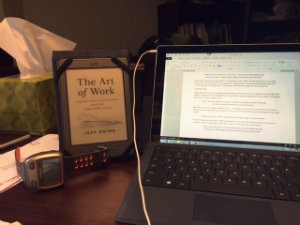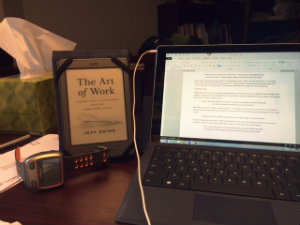The Art of Work
 Thoughts on how to find your working purpose.
Thoughts on how to find your working purpose.
I try to read a book a week, especially when I’m traveling. I read rather broadly but will always try to throw a current business or self-help type book into the mix.
Last week I read a book called “The Art of Work – A proven path to discovering what you were meant to do” by Jeff Goins. I had heard Jeff interviewed on one of the things I listen to and had found the topic intriguing.
Certainly it’s low-hanging fruit. Ask 100 professionals and 98 of them will tell you they don’t feel like they are doing what they were ‘called’ to do in life. Almost no one knows what they want to be when they grow up. Is there a way for these lost corporate souls to find their way? This is what Jeff sets out to explore.
First he gives examples of people who have, through life changing events and epiphanies, jumped form one path to another and found their true calling. These are inspirational, everyman heroes who were confronted by some life event and rose to use it as the catalyst to find their purpose.
Much of the writing is in that breathless blog post prose that is so common these days (I am guilty of this myself). The prose isn’t going to win any awards and the book doesn’t quite pull off the attempt to converge a methodology with a manifesto, but there are some useful bits.
The author splits the chapters up into the stages of the journey (more or less) from your current unease to your work purpose.
It all starts with listening to your life. Is your life trying to tell you something? Is your true calling right there, screaming at you, but you’re just not listening? When you find yourself thinking through your future plans and always arrive at the same nexus, maybe you should listen and test that direction out.
Once you start listening to the hints that your life is giving you, what do you do then? How do your test that direction out? One way is through a modern form of apprenticeship. “When the student is ready the master appears.” Look for those masters in your tentative embrace of a new direction and purpose.
Many times the master will appear to us in our search, but we won’t be open to it and will miss the opportunity. Be open to apprenticeships to test out your purpose – to begin to scratch that itch.
To summarize the first couple chapters. People do find their true calling. They do find the work they were meant to do. Sometimes it happens with a life changing event. Sometimes it’s an epiphany. Most of the time it’s just a nagging feeling that you have to learn to listen to. In order to find the work you were meant to do you have to be open to it when it comes calling.
“We all hear such a call at some point, but may ignore it, discarding the voice as a dream.”
The third thing that is put forth as advice to aspiring work purpose seekers is to not be afraid to work, sometimes for years, or even a lifetime, at your craft or art with no reward. The oft cited 10,000 hour rule is brought into play. Before you can truly appreciate and master something you have to be willing to do the work, to do the practice.
“Because we’d rather believe the fairy tale that says some people are just special. That way, we don’t have any responsibility to act”
This is great advice for someone like me who is a dabbler. I love to learn new things, but of the hundreds of new things I learn most are just distractions and hobbies. Just because I like to play backgammon against my phone doesn’t mean professional backgammon player is my calling.
The lesson is that you won’t really know if this is the work you have been seeking unless you spend enough painful time working on it. Especially when it ceases to be novel and fun. You true calling won’t be easy, but it will complete you.
“If it wasn’t hard everyone would do it. The hard is what makes it great.”
“Apparently, that’s all it takes. A little tenacity will get you to your calling.”
The next question is “Now that I’ve made myself open to my calling, what do I do?” The answer is simply to take some action in that direction. This is harder than it sounds because most people will still be unsure so it will take a leap of faith. Even if you can’t see the bridge or the road ahead start moving in that direction. Take small actions and the picture will become clearer.
Take action in the direction of your suspected purpose.
“Don’t squander your time, holding out for someone else to give you permission to start. It won’t happen that way. No one is going to give you a map. You will have to step out in to the unknown, listening for the direction as you go.”
And, since you still are searching you can expect to fail. You will set out with a destination in mind and not reach that destination. But, because you have started moving, taken action, you will find the direction to your calling along the way. Don’t be afraid to try and fail because the failure in itself will lend you clues to your true direction.
“At the times where you feel stuck, the right thing to do is take a risk and go “all in” with whatever the scariest option is.”
Everything up to this point is fairly common advice for living a rewarding life and finding some meaning in it. But the 6th chapter, for me was the nugget I was searching for. (In all the books I read I’m satisfied if I can find one nugget I can use.) Something that unlocks a keystone allowing me to access a new frame. I found this in the concept of “The portfolio life”.
“The basic idea of a portfolio life is that instead of thinking of your work as a monolithic activity, what if you chose instead to see it as the complex group of interests, passions, and activities it is?”
In my own searching I have assumed there would be one true calling, one pursuit or work domain to which all others would subsume. I have often scolded myself as having too many interests and too many projects because my frame of reference told me this would lead to mediocrity across the board.
What if we were to throw that frame of reference, that assumption, out? What if we were to say it is perfectly ok to pursue many parallel lines of work and play as long as they align with a guiding purpose? Isn’t this what the great renaissance men did? Isn’t this how the ancient philosophers approached work and life? Work was about knowledge and thinking and service; it wasn’t until recently that we parsed it up into separate disciplines.
This is the epiphany to me. Being a father, a husband, an endurance athlete, a writer, an entrepreneur and a businessman are not necessarily in competition with each other. Each serves my purpose. In its own way and without one of them I am incomplete.
“What do you secretly want to do? Do it. You can have a breakpoint and reinvent yourself. Sensible people reinvent themselves every ten years.”
I have been asking the wrong questions. The question is not “Since I should only focus on one thing, what should I be focusing all my life energy on?” The question is “How do these myriad things that I pursue align with my life purpose?” That answer will allow me to balance my portfolio life.
It just feels right.
Finally the book closes by reminding you that when you work for your true calling, the work itself is the reward. You may not be recognized ever for you effort. You do it because it is your calling, not because you expect the world to give a crap.
“…this is the role of work in our lives – not only as a means to make a living, but as a tool to make us into who we were born to be.”
We work to create our legacy, whatever that is. Our legacy is our service to the world. In the end it is about how, by doing what we are called to do, we can make the world a better place because we serve it well.
“Ultimately, we are called to call others; we are given gifts to be given away.”
Don’t get hung up in the results. When you follow your passion and find your purpose there are no results or, more accurately the results don’t matter – they take care of themselves.
“This is the work of an artist who bravely steps into their field with bold aspirations, while recognizing that the work will never be finished.”

